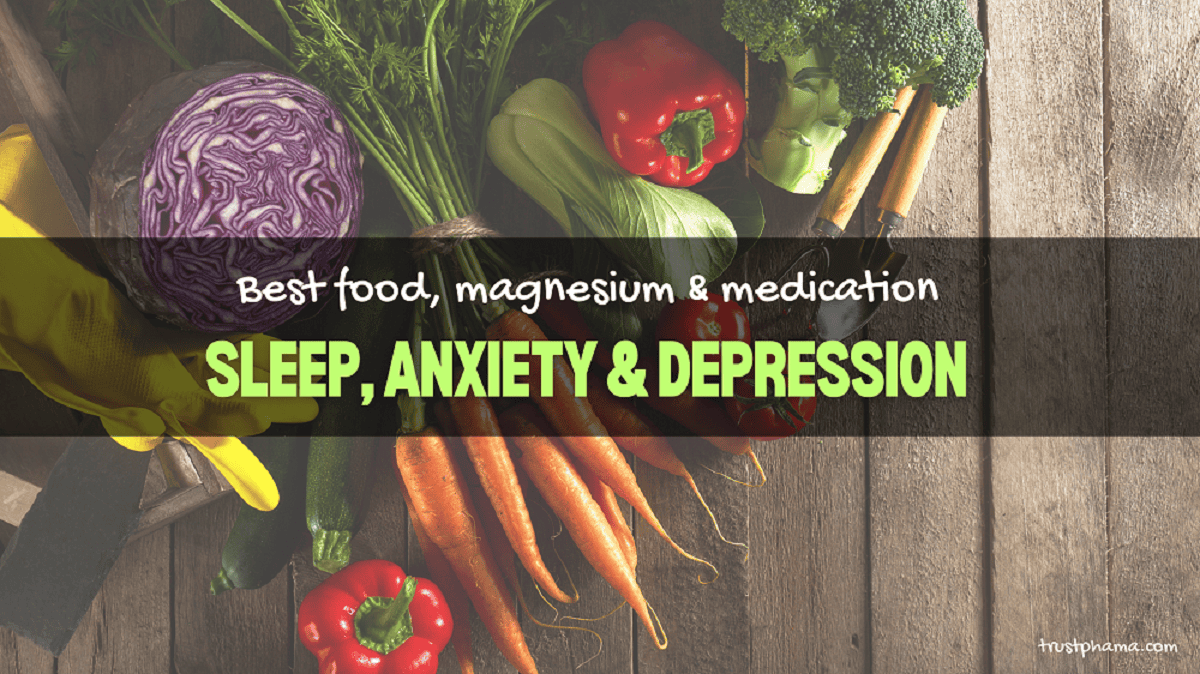Introduction
Sleep disorder problems, anxiety, and depression are some common issues that can significantly impact quality of life and health. While there are different ways to cope with these conditions, incorporating the right foods, magnesium supplements, anxiety, and sleep medications can be particularly effective. This article explores the best options for food, magnesium, and medication for anxiety and depression in each category to help improve sleep, reduce anxiety, and alleviate depression.
Best Food for Sleep, Anxiety, and Depression?
1. Food Rich in Magnesium
- Leafy Greens: Spinach, kale, and Swiss chard are higher in magnesium, which helps manage neurotransmitters that enhance relaxation and relieve anxiety.
- Nuts and Seeds: Almonds, cashews, and pumpkin seeds are excellent food sources of magnesium. They also provide healthy fats and protein, supporting overall brain and mental health.
- Legumes: Beans, lentils, and chickpeas are rich in magnesium and fiber, helping to maintain stable blood sugar levels and reduce stress.
- Whole Grains: Brown rice, quinoa, and oats are not only good food sources of magnesium but also help to stabilize your mood by promoting steady energy.
2. Food That Promotes Sleep
- Cherries: Cherries (especially tart cherries) contain melatonin, a hormone that manages and regulates sleep-wake cycles.
- Bananas: Rich in potassium and magnesium, bananas help relax muscles and promote better sleep.
- Turkey: Contains tryptophan, an amino acid that increases the production of serotonin and melatonin, aiding in sleep.
- Herbal Teas: Chamomile and valerian root teas are known for their calming effects, helping to prepare the body for sleep.
3. Food to Improve Mood
- Fatty Fish: Salmon, mackerel, and sardines are high in omega-3 fatty acids, which are essential for brain health and can reduce symptoms of depression.
- Dark Chocolate: Contains compounds that boost body serotonin levels, enhance mood, and relieve stress.
- Berries: Blueberries, strawberries, and raspberries are enriched antioxidants fruits, that help reduce inflammation and help brain health.
- Fermented Foods: Yogurt, kefir, and sauerkraut contain probiotics that enhance gut health, which is closely co-related to mental health and brain well-being.
Which Magnesium is Best for Sleep and Anxiety?
1. Magnesium Glycinate
- Absorption: Highly absorbable and gentle on the stomach.
- Benefits: Magnesium Glycinate is known for its calming effects, making it ideal for relieving anxiety and improving sleep health quality.
2. Magnesium L-Threonate
- Absorption: It is formulated and created to cross the blood-brain barrier, which may enhance cognitive function in the brain.
- Benefits: Potentially effective for reducing anxiety and improving cognitive function, which can indirectly benefit sleep.
3. Magnesium Taurate
- Absorption: Magnesium Taurate contains taurine, an amino acid with some calming properties.
- Benefits: Supports cardiovascular health and reduces anxiety, promoting better sleep.
4. Magnesium Citrate
- Absorption: Well-absorbed and commonly available.
- Benefits: Effective for relieving anxiety and improving sleep health, though it may have a mild laxative effect.
Magnesium glycinate is a highly absorbable form of magnesium, often recommended by sleep experts for its ability to promote calm, relaxation, and better sleep.
How to Sleep with Anxiety and Depression?
- Challenge Negative Thoughts: Worry and negative thoughts can keep you awake. When worries creep in, challenge their validity. Are these thoughts realistic? Can you reframe the condition and situation in a more positive light? Techniques learned through cognitive behavioral therapy (CBT) can be incredibly helpful in challenging these patterns.
- Embrace Relaxation Techniques: Deep breathing exercises, progressive muscle relaxation, and meditation are powerful tools to manage anxiety and promote sleep. These techniques quiet your mind and promote relaxation, preparing your body for sleep. Explore guided meditation apps or online resources to get started.
- Limit Stimulants: Avoid caffeine and alcohol components, especially near bedtime. While alcohol components may initially make you drowsy, affect sleep later in the night. Opt for herbal teas or warm milk as calming bedtime drinks. As an option can you go to the medication for anxiety and depression with trustphama.
Best Antidepressant Medication for Anxiety, Depression, and Insomnia?
1. Sleep Medications
- Melatonin Supplements: it’s helpful to regulate the sleep-wake cycle, especially for people with sleep problems like insomnia or jet lag.
- Benzodiazepines: Prescription sleeping pills online for short-term use to treat severe insomnia due to their sedativeness and side effects.
- Non-Benzodiazepine Hypnotics: Medications like zolpidem and zopiclone are used to treat insomnia with fewer side effects compared to benzodiazepines.
2. Anxiety Medications
- Selective Serotonin Reuptake Inhibitors (SSRIs): Commonly prescribed for long-term anxiety management. Examples include sertraline, fluoxetine, citalopram, and clonazepam.
- Serotonin-norepinephrine reuptake Inhibitors (SNRIs): Effective for treating anxiety and depression. Examples include venlafaxine and duloxetine.
- Benzodiazepines: Anti anxiety medications UK are used for short-term anxiety relief and management due to their quick-acting addiction effects. Examples include diazepam and lorazepam.
3. Depression Medications
- SSRIs: First-line treatment for depression due to their capacity and safety profile. Examples include paroxetine and escitalopram.
- SNRIs: Effective for major depressive disorder, with examples like venlafaxine and desvenlafaxine.
- Tricyclic Antidepressants (TCAs): Some older classes of antidepressants that are effective for depression management but have more side effects. Examples include amitriptyline and nortriptyline.
- Atypical Antidepressants: The medications like mirtazapine and bupropion work differently from SSRIs and SNRIs and may be used when other management is ineffective.
Conclusion
Managing sleep problems, anxiety, and depression involves a holistic approach that includes diet, supplements, and medications. Incorporating foods rich in magnesium, omega-3 fatty acids, and antioxidants can support brain health and improve mood. Consult a doctor and healthcare professional before starting any new treatment, to ensure it is safe and suitable for your particular individual needs.
